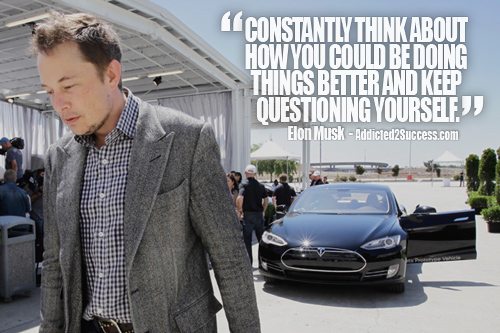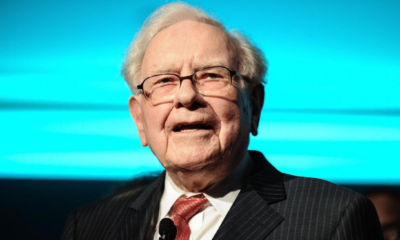Entrepreneurs
The Success of Elon Musk

The mind blowing visionary Elon Musk is transforming the way we live today. He founded his first company (Zip2) at the age of 23 and sold it for $300 million. But that was not enough to quench Elon’s thirst for startup success, so he opened a new online payment platform called PayPal which allows users to safely buy and sell online.
Since then, Elon has made solar energy affordable for the public through his company SolarCity, and has made the dream of an electric car possible and inexpensive with Tesla Motors. If that wasn’t enough, his SpaceX space travel adventures have proven to be a major success with a very promising future.
Musk‘s mind was set to focus on things that would most affect the future of humanity: The internet; clean energy; and space.
Elon Musk’s Early Years
 Elon taught himself computer programming at an early age, which allowed him to sell his first program by the age of twelve. A space game he created named “Blastar” for $500.
Elon taught himself computer programming at an early age, which allowed him to sell his first program by the age of twelve. A space game he created named “Blastar” for $500.
Leaving home at seventeen, Elon avoided serving the South African Military, and decided he wanted to live in the U.S, believing “It is where great things are possible.”
Elon moved so that he could acquire his Ph.D. In applied physics and materials science at Stanford University in California but ended up dropping out early to fullfil the dream of launching his first startup.
Elon’s Career
Zip2
(Founded In 1995)
 Elon’s first taste at being an entrepreneur was through the creation of ‘Zip2‘. A website that provided online content publishing software for various news organisations, which he started with his brother Kimbal Musk. It wasn’t long before they managed to get investment for Zip2 from such companies as: The New York Times, HEARST Corporation, KnightRidder and many others.
Elon’s first taste at being an entrepreneur was through the creation of ‘Zip2‘. A website that provided online content publishing software for various news organisations, which he started with his brother Kimbal Musk. It wasn’t long before they managed to get investment for Zip2 from such companies as: The New York Times, HEARST Corporation, KnightRidder and many others.
Although ‘Zip2‘ was only a small business. Compaq’s AltaVista bought ‘Zip2‘ for over $300 million, which made Elon and his brother multi-millionaires by twenty-eight years of age.
“Work like hell. I mean you just have to put in 80 to 100 hour weeks every week. [This] improves the odds of success. If other people are putting in 40 hour work weeks and you’re putting in 100 hour work weeks, then even if you’re doing the same thing you know that… you will achieve in 4 months what it takes them a year to achieve.” – Elon Musk
PayPal
(Founded In 1999)
 Musk used $10 Million of his earnings from Zip2 to create an online financial service and e-mail payment company in 1999 called ‘X.com‘. Musk acquired ‘Confinity Inc‘ which was initially a Palm Pilot payments and cryptography company. The merged company’s intentions were to keep the name ‘X.com‘, but public surveys eventually showed that major consumers considered the name ‘X.com‘ vague and mistakenly pornographic at which they found ‘PayPal’ more appealing to its intentions.
Musk used $10 Million of his earnings from Zip2 to create an online financial service and e-mail payment company in 1999 called ‘X.com‘. Musk acquired ‘Confinity Inc‘ which was initially a Palm Pilot payments and cryptography company. The merged company’s intentions were to keep the name ‘X.com‘, but public surveys eventually showed that major consumers considered the name ‘X.com‘ vague and mistakenly pornographic at which they found ‘PayPal’ more appealing to its intentions.
After an initial public offering, the company was bought out by eBay.
“We could either watch it happen, or be a part of it.” – Elon Musk
Space X
(Founded In 2002)
 Elon’s obsession about space was showcased from the game ‘Blastar‘ he had created when he was twelve years old. Eventually exhibiting the world that he could beat NASA in space technology. At which he produced the company ‘SpaceX‘.
Elon’s obsession about space was showcased from the game ‘Blastar‘ he had created when he was twelve years old. Eventually exhibiting the world that he could beat NASA in space technology. At which he produced the company ‘SpaceX‘.
His greatest vision was to yield technology that takes you and I to another planet! And funded the project alone coming close to $100 million, spending a majority of his net-worth during that time.
In September 2009, SpaceX’s Falcon 1 rocket became the first privately funded liquid-fuelled vehicle to put a satellite into Earth orbit. On 25 May 2012, Elon’s launched his next project “the SpaceX Dragon” vehicle successfully docking with the ISS, making history as the first commercial company to launch and dock a vehicle to the International Space Station.
Last week Elon Musk announced that his team has built a system that allows one to design rocket parts with “hand movements through the air.”
“There’s a tremendous bias against taking risks. Everyone is trying to optimize their ass-covering.” – Elon Musk
Tesla Motors
(Founded In 2003)
 Musk‘s idea for electric cars had stirred into his mind long before ‘Tesla Motors‘ was present. Co-founding ‘Tesla Motors‘ and contributing to the company as head product designer, Musk managed to build the first viable electric sports car to help humanity break away from fossil fuels. The high-end electric car, the Tesla Roadster, was sure enough in high demand, which allowed ‘Tesla Motors‘ to produce an affordable model to launch to the public.
Musk‘s idea for electric cars had stirred into his mind long before ‘Tesla Motors‘ was present. Co-founding ‘Tesla Motors‘ and contributing to the company as head product designer, Musk managed to build the first viable electric sports car to help humanity break away from fossil fuels. The high-end electric car, the Tesla Roadster, was sure enough in high demand, which allowed ‘Tesla Motors‘ to produce an affordable model to launch to the public.
Musk hit a snag in 2007 as ‘Tesla Motors‘ was falling short of available funds. The cost to build the cars at a high quality were over $140,000, at which their intentions were to sell the cars for $65,000. At this point, Musk had to take responsibility for the companies declination. Hard decisions had to be made and Elon spent additional dedication to the company, forcing the company to replace Martin Eberhard as CEO, which Elon claimed the duty.
Tesla Motor’s come-back was outstanding and almost over schedule, by substituting a daimler smartcar’s gas engine with the Tesla drive-train and battery. At which the company gained $70 million.
“You want to be extra rigorous about making best possible thing you can, find everything that’s wrong with it and fix it. Seek negative feedback, particularly from friends” – Elon Musk
Elon’s Financial Crisis
Musk faced the worst crisis of his career, all 3 of his companies were collapsing. Things that appeared unneeded had to be closed down. Musk had to lay off almost 1/3 of his staff and close Tesla’s branch in Detroit.
‘SolarCity‘ began staggering, the bank that had backed their leases, pulled out of the deal.
Musk was in the fight of his life. With only a week’s worth of cash in the bank. There was little time to resolve. Musk never thought it was possible to have a nervous breakdown. Forced into only one direction, in hopes of keeping his empire afloat, Elon decided to raise $40 million to keep the company going out of his own pocket to keep the dream alive.
After six years of funding and advancing his companies, the fourth launch through SpaceX was a great success.
NASA decided to team up with Elon and fund ‘SpaceX’ for a $1.6 billion contract. Much to the publics surprise, Elon managed to pull through with An unexpected and heroic recovery.
His Critiques
Entrepreneurs and other company workers starved to see ‘Tesla Motors‘ fail due to the company’s products being seen as an attack on mainstream vehicles. Musk launched the electric cars to the public, which had the public and other companies in doubt of the success of ‘Tesla Motors‘. Poll votes and TV hosts belittled Tesla cars and told the public they weren’t worth buying.
But Elon did not care and decided to push through to make it happen. He released an offering to the Public in 2010 for Tesla, and was granted a place in the stock market, there hadn’t been an IPL since Henry Ford and the net-worth grew to $2 billion. This courageous move put faith in other companies to finance and produce electric cars.
Fun Elon Musk Fact:
Jon Favreau, the director of the movie “Iron Man” decided to base Robert Downy Jr’s character off the real life billionaire inventor Elon Musk, and to show his appreciation, he even invited Elon for a short cameo appearance in Iron Man II.
Conclusion
Most of Elon’s innovative ideas and visions became true. His learning curves from failure and loss, didn’t vanquish his visions and amazing goals for the future. Elon Musk never seizes to dream big, whether it be travelling to the moon or Mars to changing the way that we drive and operate cars, or creating sustainable energy, changing the culture and technology of the commerce businesses, to financing dreams of space travel in advancing what was forty decades out of date.
Elon Musk continues to pursue his goals to change humanity and live up to the expectations he set for himself in risk taking and self-confidence. Even when years of effort seems to be a loss in the moment. He believes that his success still will prevail.
What a Legend!
Elon Musk Picture Quote

Feature Image Courtesy of Wired

Entrepreneurs
How Entrepreneurs Are Harnessing LLCs to Launch Successful Startups
LLCs have unique advantages for starting up and growing a successful business

In my entrepreneurial journey, I’ve learned that LLCs have unique advantages for starting up and growing a successful business. But, before delving into the advantages, it’s essential to grasp the fundamentals of what an LLC is and how it operates.
What is an LLC?
An LLC is a hybrid business entity that combines the liability protection of a corporation with the pass-through taxation of a partnership or sole proprietorship. This unique blend provides entrepreneurs with the best of both worlds: personal asset protection and simplified taxation.
One of the most significant advantages of an LLC is its limited liability feature. This means that as the owner, my personal assets are shielded from any liabilities or debts incurred by the business.
In the event of lawsuits or financial obligations, only the assets of the LLC are at risk, offering me peace of mind and protecting my personal wealth.
Advantages of Forming an LLC
Flexibility in Management and Structure
Another aspect of the LLC that appealed to me was its flexibility in management and structure. Unlike corporations, which have rigid hierarchies and formalities, LLCs allow for a more relaxed approach to governance. As the founder, I have the freedom to structure the company in a way that suits the needs and goals of my startup.
For instance, LLCs can choose to be managed by their members (owners) or appoint a manager to oversee operations. This flexibility enables me to maintain full control of the business or delegate management responsibilities to trusted individuals while retaining ownership.
Additionally, LLCs are not bound by strict meeting requirements or extensive record-keeping obligations, reducing administrative burdens and allowing me to focus on building and growing the business.
Pass-Through Taxation and Financial Efficiency
One of the most attractive features of an LLC, particularly for startups, is its pass-through taxation. Unlike corporations, which are subject to double taxation (taxation at both the corporate and individual levels), LLCs pass profits and losses directly to their members’ personal tax returns.
This tax efficiency not only simplifies the filing process but also allows for greater flexibility in managing cash flow and reinvesting profits back into the business. As an entrepreneur, minimizing tax liabilities and maximizing financial efficiency are critical components of long-term success, and the pass-through taxation feature of an LLC aligns perfectly with these objectives.
Enhanced Credibility and Professionalism
Establishing an LLC can also enhance the credibility and professionalism of a startup. Unlike sole proprietorships or general partnerships, which may be perceived as informal or less legitimate, an LLC provides a formal business structure that instills confidence in customers, investors, and partners.
By operating under the umbrella of an LLC, I can present my startup as a reputable and established entity, which can open doors to opportunities such as securing financing, attracting top talent, and forging strategic partnerships.
This enhanced credibility can be a significant advantage, particularly in competitive industries or when seeking to differentiate my startup in the market.
Protection of Intellectual Property and Brand Assets
For startups built around innovative ideas or unique intellectual property, protecting these assets is paramount. An LLC offers an additional layer of protection for intellectual property and brand assets, safeguarding them from infringement or unauthorized use.
By registering trademarks, copyrights, or patents under the name of the LLC, I can establish legal ownership and enforce my rights more effectively in the event of disputes or infringement claims. This protection not only preserves the value of my intellectual property but also enhances the overall stability and longevity of the startup.
Steps to Form an LLC
Let us now look at the general steps to form an LLC for your business:
Step 1: Choose a Name for Your LLC
Selecting a unique and distinguishable name is the first step in forming an LLC. Ensure that the name you choose complies with the rules set by your state’s LLC division. Typically, the name must end with “Limited Liability Company,” “LLC,” or an abbreviation of these terms.
Additionally, the name should not infringe on the trademarks of existing businesses.
Step 2: Designate a Registered Agent
A registered agent is an individual or entity appointed to receive legal documents, such as lawsuits or subpoenas, on behalf of the LLC. The registered agent must have a physical address within the state where the LLC is formed.
For instance, if you are forming an LLC in Texas, ensure that your registered agent has a physical address in Texas.
This role is crucial for ensuring that the LLC remains compliant with legal requirements and maintains good standing.
Step 3: File Articles of Organization
The Articles of Organization, also known as a Certificate of Formation or Certificate of Organization in some states, is a document that formally establishes the LLC. You’ll need to submit this document to the appropriate state agency, usually the Secretary of State or Division of Corporations.
The articles typically include basic information such as the LLC’s name, address, registered agent details, and the purpose of the business.
Step 4: Create an Operating Agreement
While not always a legal requirement, drafting an operating agreement is highly recommended for LLCs. This document outlines the ownership structure, management roles, voting rights, profit-sharing arrangements, and other important aspects of the LLC’s operations.
Even if you’re the sole owner of the LLC, having an operating agreement in place can help clarify expectations and prevent disputes in the future.
Step 5: Obtain an Employer Identification Number (EIN)
An Employer Identification Number (EIN), also known as a Federal Tax Identification Number, is a unique nine-digit number assigned by the Internal Revenue Service (IRS) to identify your LLC for tax purposes.
Even if your LLC doesn’t have employees, obtaining an EIN is necessary for opening a business bank account, filing taxes, and conducting other financial transactions.
Step 6: Obtain Necessary Permits and Licenses
Depending on the nature of your business and its location, you may need to obtain various permits, licenses, or certifications to operate legally. These requirements can vary widely from one industry and jurisdiction to another. Common examples include business licenses, zoning permits, health permits, and professional licenses.
In my entrepreneurial journey, the decision to establish my startups as LLCs has been instrumental in mitigating risks, optimizing financial performance, and positioning my ventures for long-term success.
By harnessing the advantages of the LLC structure, I’ve been able to navigate the complexities of entrepreneurship with confidence and resilience, laying the groundwork for a bright and prosperous future.
Entrepreneurs
Build a Strong IT Team with These Smart Hiring Tips
Without dedicated IT staff, your company may not be able to function as efficiently or effectively

The role of IT staff in your company is not only essential but also ever-evolving. As your business grows, so does the need for qualified IT staff and more robust recruiting solutions.
After all, from maintaining and troubleshooting the computer systems that keep your business running smoothly, IT staff also help employees stay connected and productive by providing technical support at all times. (more…)
Entrepreneurs
5 Important Legal Tips Every Entrepreneur Should Know
With a firm commitment to legal knowledge, you pave the way to grow your business sustainably

While creativity, drive, and strategic vision are paramount, integrating legal insight into your entrepreneurial toolkit can be a game-changer.
This comprehensive guide delves deeper into the five critical steps that can empower you to navigate the intricate legal landscape and propel your venture toward prosperity. (more…)
Entrepreneurs
6 Hacks to Boost Your Productivity as a Business Owner
To improve how much you get done each day, it’s smart to establish routines and use careful planning

Entrepreneurs are always looking for ways to get more done with the time and resources they have. Business owners can use clever productivity tricks to break these limits and make the most of their projects. (more…)
-

 Life4 weeks ago
Life4 weeks agoThe Power of Elevating Others: Steps to Change Your Life for the Better
-

 Life4 weeks ago
Life4 weeks agoThe Best Techniques to Boosting Your Memory in a Busy World
-

 Success Advice3 weeks ago
Success Advice3 weeks agoAn Easy to Follow 8 Step Strategy for Creative Problem Solving
-

 Entrepreneurs4 weeks ago
Entrepreneurs4 weeks agoCrisis-Proof Your Business Now: Essential Strategies for Every Entrepreneur
-

 Success Advice3 weeks ago
Success Advice3 weeks ago10 Landing Page Hacks Experts Are Using to Generate Leads
-

 Entrepreneurs2 weeks ago
Entrepreneurs2 weeks agoThe Mindset Shifts Required to Become a Successful Online Entrepreneur
-

 Success Advice2 weeks ago
Success Advice2 weeks agoThe Power of Ethical Leadership: How Integrity Drives Success
-

 Entrepreneurs2 weeks ago
Entrepreneurs2 weeks ago6 Hacks to Boost Your Productivity as a Business Owner






























8 Comments